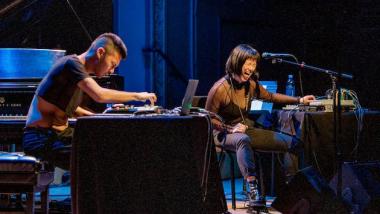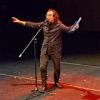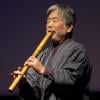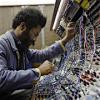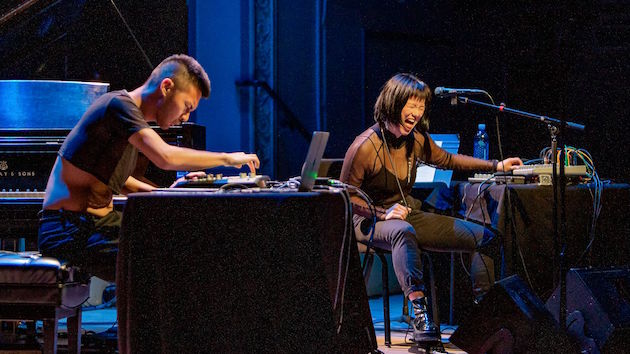
“The point isn’t to compare these artists, it’s to marvel at all the different vocal superpowers they bring to this stage.” That’s how Lucy Dhegrae described the breathtaking array of musical talent on offer at this year’s Resonant Bodies Festival. Held Sept. 3–5 at Roulette in Brooklyn, the festival featured nine sets from performers of wildly different backgrounds, many of them performing music that they themselves had written.
Much of that music flew in the face of clichés about the plainspoken emotionality of vocal music. Charmaine Lee opened the festival with the world premiere of Littorals, a joint improvisation with Conrad Tao that featured a bustling array of lip trills and swallowed exhalations accompanied by jittery electronics. (Tao also offered some spacey piano interjections.) Erin Gee’s set — comprising three of her vocal works plus a deconstructed monologue from her brother Colin that she wrote background music for — was similarly virtuosic in its abstraction. Her works are relentlessly nondevelopmental, stringing together bursts of stuttered consonants with pointillistic instrumental interjections into a scraggly dawn chorus of skeletal birds.
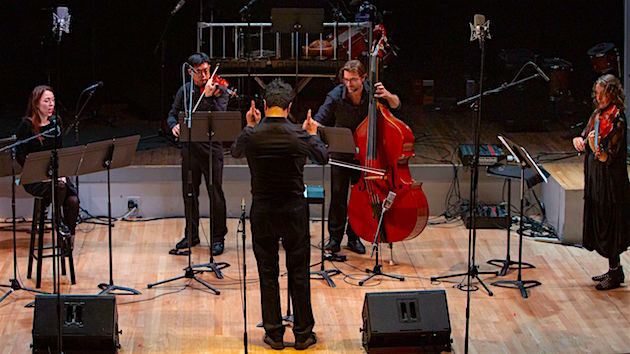
Even in sets with comprehensible text, open emotionality was far from guaranteed. Kate Soper combined her Dialogues I and Fragments of Paramenides into a single ruthlessly abstract presentation on dialogic forms and the nature of perception and reality — a presentation deconstructing both late-Romantic art songs and academic lectures about them.
Musically, Jane Sheldon’s Poem for a Dried-Up River (world premiere) was more conventional, an extended setting of Alice Oswald’s poem of the same name for two singers and mixed ensemble, but it included choreography as well: Over the course of the work, Sheldon fought to unspool a thick roll of clay across the stage, straining against invisible constraints to stand up from her crouches and crawls. It was a gripping abstract drama, but it dragged toward the end, robbing the climactic gesture of its full power.
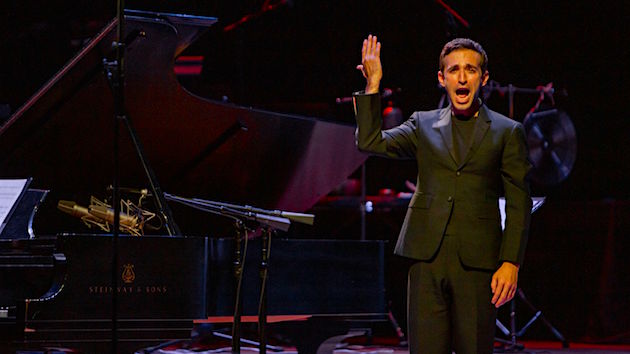
More conventional yet was hip countertenor Anthony Roth Costanzo, who offered a selection of arias and songs from composers he’s worked with, interspersed with lively banter. That a conventional recital format still has much to offer was most evident in Suzanne Farrin’s “Ne’ marmi,” an a cappella setting of a text by Michelangelo wherein Costanzo’s arch voice took on the rich, subtle textures of fresh vellum. His take on Philip Glass’s “Liquid Days” was something of a letdown, however, stilted and missing the playful tenderness of David Byrne’s text.
Where Glass’s minimalism is frenetic, Arooj Aftab’s hovers suspended out of time. Aftab led a trio rounded out by pianist Vijay Iyer and multi-instrumentalist Shahzad Ismaily in Shams Never Wants to Leave Me but Keeps Doing It, to the Point Where I Don’t Even Know Anymore, a work in three mountainous waves built from hovering roulades, prolonged reverb effects, and washes of static noise.
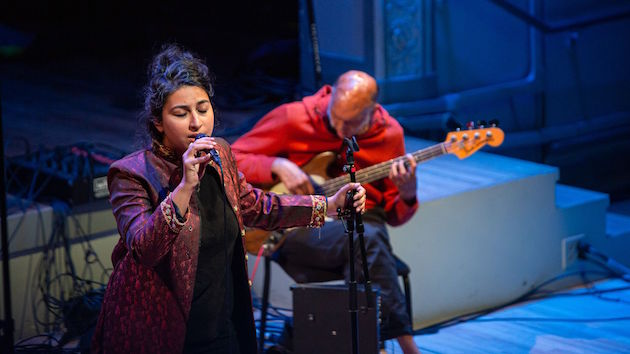
At the other extreme from Lee and Gee’s asceticism were the over-the-top bonanzas from Ted Hearne and Blythely Oratonio (Stephanie Blythe’s drag persona). Hearne presented excerpts from a hard-driving song cycle-in-process, setting texts by Dorothea Lasky. To me, Lasky’s texts seem steeped in a feminine monstrosity born from rebelling against patriarchal demands that women be beautiful and refined — “I want to be an ugly, wretched, bleeding thing/Pouring out on the windmills/I want to be the locked tiger they can’t lock up/Until it murders and then rages through the fields” — and hearing Hearne step into that narrative I sat uneasily with me. He may have been attempting a critique of toxic masculinity, but try as I might, I couldn’t find a moment where such a critique was clearly articulated.
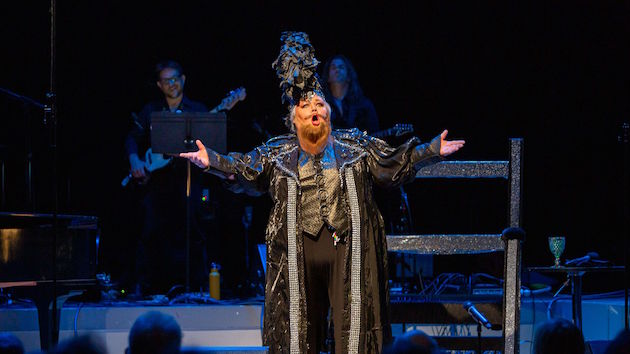
Oratonio’s set had even more gender play going on. Entering to sing Puccini’s “Nessun dorma” (None shall sleep) in a massive plumed helmet and a stone butch leather-dyke biker jacket, Oratonio managed to channel both male operatic superstars and various queer elders whose wings I’ve sheltered under. It was a brash set full of wonderfully bizarre turns — a pseudo-Classical arrangement of “Jessie’s Girl” followed quickly by a hard-rock take on “Send in the Clowns” mashed up with “Vesti la giubba” (Put on the costume) — and it was deeply surreal to watch in front of a well-heeled audience who gasped in shock that a drag king could sound like a lyric tenor, and who sat politely through the sloshed-out key changes instead of drunkenly whooping and trying to shove dollar bills into any crevice of Oratonio’s clothing that would hold them. I only wish he had had more time on stage, so that he could have gone further in unearthing the ways male star power has too often gone hand-in-hand with the destruction of women’s lives.
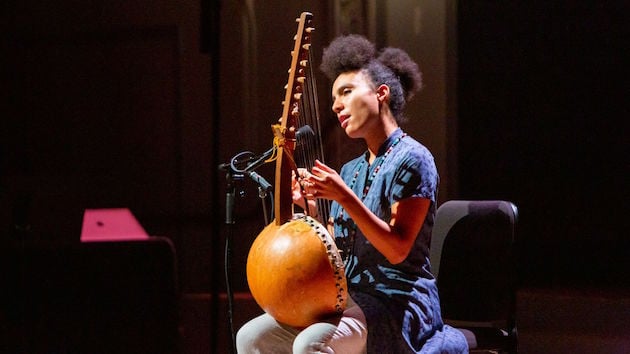
And amidst these glam extravaganzas and virtuosic displays, there was still some time for a simple song. Anaïs Maviel opened the second night of the festival with a collection of songs for voice and n’goni (West African string instrument) followed by an audience-participation number built around a set of playful French puns. These were earnest, heartfelt numbers, and their simplicity made small changes land with large effect, as when Maviel abruptly dropped the tempo of a long-running ostinato to a crawl as she lingered over the word slow. It was a transparent gesture, but it worked. Even here, in the heart of our digital age, there’s nothing quite like a human voice to reach a human heart.

